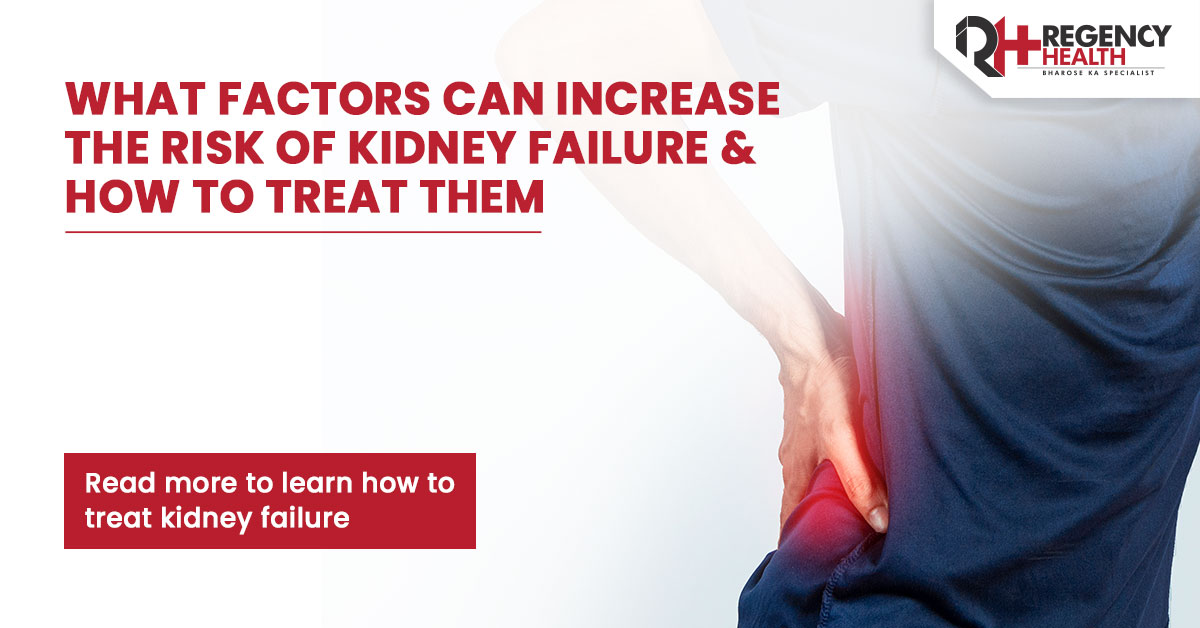Kidney Failure: Causes, Symptoms and Treatment

Kidneys are one of the most vital organs in the human body. They play an important role in filtering waste products, toxins, and excess fluid from the blood, which are then excreted through urine. Apart from this, kidneys also regulate electrolyte balance, maintain blood pressure, and help in red blood cell production.
When the kidneys lose their ability to filter waste effectively, the condition is known as kidney failure or renal failure. It can develop suddenly (acute kidney failure) or gradually over time (chronic kidney disease). If left untreated, kidney failure can cause life-threatening complications.
What is Kidney Failure?
Kidney failure occurs when your kidneys are unable to perform their normal functions. As a result, waste products and toxins build up in the body, leading to symptoms like fatigue, nausea, swelling, and shortness of breath.
There are two main types of kidney failure:
- Acute Kidney Failure: A sudden loss of kidney function, usually due to dehydration, infections, or certain medications.
- Chronic Kidney Disease (CKD): A gradual decline in kidney function over months or years, often caused by diabetes or high blood pressure.
Early detection is key if diagnosed in the initial stages, medical intervention can slow kidney damage and significantly improve long-term outcomes.
Who Does Kidney Failure Affect?
Kidney failure can affect anyone, but certain factors increase the risk, including:
- Long-term diabetes
- Family history of kidney disease
- Smoking and obesity
- Prolonged use of painkillers or certain medications
- Heart diseases and infections
Regular health check-ups — especially for individuals with diabetes, hypertension, or a family history of kidney disorders — are crucial for early detection.
Symptoms of Kidney Failure
Symptoms of kidney failure may not appear until significant damage has occurred. Common signs include:
- Swelling in ankles, feet, or hands
- Persistent fatigue or weakness
- Decreased or excessive urination
- Shortness of breath
- Nausea and vomiting
- Loss of appetite
- Difficulty concentrating
- Muscle cramps
- Persistent itching
If you experience any of these symptoms, consult a nephrologist immediately for evaluation.
Causes of Kidney Failure
The major causes of kidney failure include:
- Diabetes: High blood sugar damages blood vessels in the kidneys.
- High Blood Pressure: Increased pressure weakens kidney filtering units.
- Glomerulonephritis: Inflammation of kidney’s filtering units.
- Polycystic Kidney Disease: Genetic disorder that causes cysts in the kidneys.
- Recurrent Kidney Infections: Chronic infections that impair kidney function.
- Obstruction: Kidney stones or enlarged prostate blocking urine flow.
Other causes may include autoimmune diseases, severe dehydration, or reaction to certain drugs or toxins.
How is Kidney Failure Diagnosed?
Kidney failure is diagnosed through:
- Blood Tests: To check creatinine and urea levels.
- Urine Tests: To detect protein or blood in urine.
- Imaging Tests: Ultrasound, CT scan, or MRI to identify structural abnormalities.
- Kidney Biopsy: To determine the cause of kidney damage.
Early diagnosis allows doctors to initiate treatment to slow down disease progression.
How is Kidney Failure Treated?
Treatment depends on the cause and stage of kidney failure. The primary goal is to manage symptoms, prevent complications, and slow the progression of kidney damage.
Treatment options include:
- Medications: To control blood pressure, manage blood sugar, and reduce swelling.
- Dialysis: A procedure that removes waste and excess fluid when kidneys can’t function properly.
- Kidney Transplant: Replacing the failed kidney with a healthy donor kidney.
- Dietary Modifications: A low-sodium, low-potassium, and protein-controlled diet helps reduce kidney workload.
- Lifestyle Changes: Quitting smoking, maintaining healthy weight, and regular exercise support overall kidney health.
At Regency Multi Super Speciality Hospital, the nephrology team works closely with dietitians, physiotherapists, and counsellors to provide comprehensive care for patients undergoing dialysis or kidney transplantation.
Patient education plays a vital role in slowing kidney damage understanding your medications, following a kidney-friendly diet, and managing lifestyle factors can make a major difference in long-term outcomes.
If you or your loved one experience symptoms such as persistent swelling, fatigue, or changes in urination, book a consultation with our nephrology specialists for timely diagnosis and treatment.
Conclusion
Kidney failure is a serious yet manageable condition when diagnosed early and treated with the right medical guidance. Regular health check-ups, timely intervention, a healthy lifestyle, and strict adherence to prescribed medications can significantly slow disease progression and improve overall quality of life. Patient awareness and proactive care play a vital role in preventing complications and achieving better long-term outcomes.
Choosing the right medical facility and specialist is equally important for effective kidney care. Access to experienced doctors, advanced diagnostic tools, and comprehensive treatment options ensures accurate diagnosis and timely management of kidney disease, and consulting a trusted kidney specialist in Gorakhpur at Regency Hospitals can make a meaningful difference in controlling symptoms and improving recovery.
Also Read: Top 10 Foods for Kidney Health
Frequently Asked Questions (FAQs)
Can kidney failure be reversed?
In some cases, acute kidney failure can be reversed with prompt treatment. However, chronic kidney failure usually cannot be cured but can be managed effectively to slow its progression.
What are the early warning signs of kidney failure?
Early signs include swelling, changes in urination, unexplained fatigue, nausea, and high blood pressure.
How can i prevent kidney failure?
You can prevent kidney failure by managing diabetes and hypertension, staying hydrated, eating a balanced diet, avoiding excessive salt, and going for regular check-ups.
When is dialysis required?
Dialysis is required when kidney function drops below 10–15% of normal and the body can no longer eliminate waste or maintain fluid balance.
Can i live a normal life with kidney disease?
Yes, with proper medical management, lifestyle changes, and support, many people with kidney disease live long and fulfilling lives.

 Call-an-Ambulance
Call-an-Ambulance



